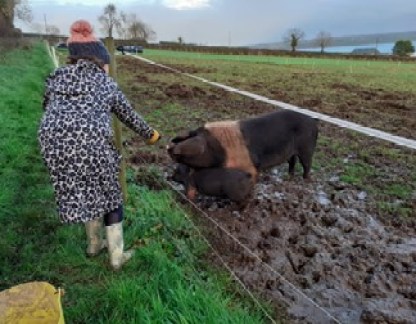
Agriculture at the crossroads
How many young people have ambitions to become farmers? If you ask this to an average primary or secondary school class, not many hands will be raised. This goes for rural areas and not just urban centres. It’s not just an issue on the island of Ireland or even the UK. All across Europe there is increasing anxiety about the lack of youth getting into agriculture, and the situation is not much different further afield.


Getting to the root of the issue
Why is this happening? We could look at this as an economic issue: farming is not very well paid. We could also look at it as a cultural issue: farming isn’t seen to be at the cutting edge of development. We could actually look at a whole range of factors to explain what’s happening. But whatever explanation we come up with, the direction of travel is worrying. Farms can only survive by maximising economic efficiency, which means farming more intensively with more chemicals and mechanisation. The alternative is that farmland is simply developed for other purposes. We become more heavily reliant on imports, effectively paying unfairly low prices to labourers in order to make up for expensive imports, which are subject to all kinds of factors outside our control (as the Ukrainian grain situation has shown us). And at home, communities are becoming more detached from the land and unknowingly behave in ways that destroy it. This whole process has gone further in the USA, as Wendell Berry powerfully narrates.
Humans all rely (directly or indirectly) on farming to survive. But agriculture is a complex thing to engage with: it combines social, economic, political, and environmental factors, as well as a lot of very hard work. Some may find it easier to disengage from it all together and let it happen ‘somewhere else’. From a Christian perspective, this is not an option. Farms are at the heart of God’s provision of life to the world. Farms produce the food, and our eating is part of how we receive the land as God-given gift. In all their human and non-human complexity, farms are part of the ‘all things’ that are held together in Christ and are reconciled together in him (Colossians 1:15-20). So agriculture is worth keeping at the heart of our communities.

Sowing seeds for tomorrow
All of these issues were discussed at a recent event in Jubilee Farm. In partnership with Tearfund, we gathered a group of people from across the island of Ireland who are passionate about the land. These were farmers, theologians and Church leaders – and often a mixture of all three! We heard stories about the challenges of farming and the fact that churches (and society at large) are increasingly disengaged from this key aspect of rural life.
But we didn’t just analyse the situation – we wanted to develop a constructive, hopeful response. Our friends from Tearfund offered a good starting point: at root of most of our economic and environmental issues is a scarcity mindset that pushes us towards short-term, individualistic lifestyles. Jesus opens up a better way: an abundance mindset, where all things have been given from God to the whole community who can work together towards a common good. It can sound like a utopian vision, but from the book of Acts it’s pretty clear that this is what the Church can be like.

To move from where we are to where we want to be cannot happen overnight. Relational change that brings us closer to each other and the land itself is a long-term project. It needs a change of mind and heart, a holistic re-education. This is not the kind of education that trains people to use their heads only, to avoid dirty hands in favour of a clean office. It’s the kind of education that happens on the land, in the farm, and with each other. This is the kind of education that we are developing at Jubilee Farm. We’re at the beginning of the journey but the momentum’s already gathering. Plus, we know that the story doesn’t end in degradation and brokenness, but in the reconciliation of all things in Christ. Get in touch with us if you want to learn more, but otherwise – watch this space!
Matt Williams (matt.williams@jubilee.coop) is a theologian, educator and social activist and has been on the board of Jubilee Farm since it was founded.


Yes farming is foundational, the first occupation mentioned in Genesis. Malgwi, a young man involved in Faith and Farming programme, encourages Nigerian farmers whose society places a low value on their work. by asking them: How often do you need the services of a doctor, Maybe 2 or 3 times a year. How many times do you need the services of a farmer? EVERY DAY